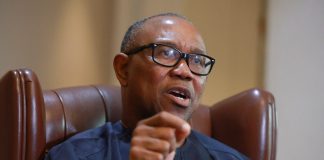🌿 Ruzu Non-Alcoholic Herbal Bitters
Ruzu Non-Alcoholic Herbal Bitters is a natural health supplement specially formulated to:
- ✅ Promote general wellness
- ✅ Detoxify the body
- ✅ Support the treatment of various ailments
Made from a powerful blend of 100% organic and medicinal herbs, Ruzu is completely alcohol-free, making it ideal for:
- 👪 All age groups
- 🌱 Health-conscious individuals
- 🌿 Anyone seeking non-alcoholic herbal remedies
Whether you're looking to boost your vitality, cleanse your system, or support healing the natural way, Ruzu Bitters offers a trusted herbal solution.
The Nigeria Union of Petroleum and Natural Gas Workers, NUPENG, has explained that it is embarking on strike action on Monday, September 8, 2025, because Dangote Refinery and its management want to bring back slavery into Nigeria’s workforce.
The union made its position known in a statement released on Sunday, signed by Williams Akporeha and Afolabi Olufemi, President and General Secretary.
NUPENG had last week asked members to down tools over anti-labour activities by Dangote Refinery.
However, stakeholders including the Petrol Tanker Drivers and the Direct Trucking Company Drivers Association, DTCDA, have kicked against NUPENG’s planned strike.
But in update on Sunday, NUPENG insisted that Dangote-sponsored groups cannot stop its planned strike action.
According to NUPENG, DTCDA is the recruiting company that was formed by Alhaji Sayyu Aliu Dantata and Alhaji Aliko Dangote for the 10,000 CNG trucks they are importing.
It dismissed DTCDA as an unauthorised union for tanker drivers.
“For the information of the public, the DTCDA is the association which the Dangote Group of Companies has formed for the drivers to join compulsorily rather than allowing drivers to join NUPENG, which is the only statutorily recognised union authorised to unionise petroleum tanker drivers.
“Slavery ended centuries ago, but some unscrupulous capitalists are making efforts to bring it back. Any worker who cannot exercise the right of association is no better than a slave.
“Ordinary Nigerians should neither encourage nor support slavish working conditions,” parts of the statement read.
















